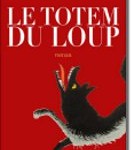Originally published on Rue89 23/3/2010
Only the “Little Red Book” by Mao Zedong has scored better; the “Wolf Totem” by Jiang Rong is the biggest publishing succes in China: 4 millions copies have been sold and probably 16 millions including piracy.
Two years ago, Rue89 had presented this social phenomenon. The success has not stopped since 2004, the book still tops sales. The rights were purchased in 28 countries. For English, 100,000 dollars were paid by the British publisher Penguin, which entrusted the translation to the well-known translator, Howard Goldblatt. The book was awarded the first Man Asia prize in 2007 and Jean-Jacques Annaud is making a film, which should boost sales.
Several levels of reading:
Chen Zhen, a “young educated” Chinese sent to Mongolia joins the efforts by the Communists to settle the nomads and exterminate the wolves. It is the shock of freedom, the vast plains, horses and wolves, essential elements of the ecosystem. This balance will soon be destroyed. With the death of wolves, rodents proliferate and develop desertification. A reality that everyone can understand in Beijing where sandstorms are more and more spectacular.
The Mongolian, nomads, are conquerors, wolves, very different from the Chinese, farmers and sheep, victims of dictatorships for millennia. And the message is clear, the sheep have to become wolves !
The book is supported by entrepreneurs who sees it as an apology of international competition, by liberals like Jian Rong the author, stressing that freedom and democracy are necessary. A population without a spirit of freedom is easily dominated; this was demonstrated by the history of invading Mongols and Manchus in China.
The identity of the author unknown for a long period:
Jiang Rong’s identity was only revealed after the award of the Man Asia Literary Prize, but the author, Lu Jiamin, has not been allowed to visit Hong Kong to receive the award. This well-kept secret about his identity possibly prevented the book of being banned from the start.
Lu Jiamin was born in 1946, near Shanghai, in a family of Communist activists. He is a Red Guard while his father, a senior official, is being questioned. He left in 1967 as a volunteer to Mongolia, where he will stay eleven years (three in prison following his remarks about a local boss of the Party).
In 1978, involved in the movement of the “Beijing Spring”, he just avoids serious trouble. After university studies in economics and teaching responsibilities, his participation in the democratic movement in Tiananmen Square again brought him eighteen months in prison.
He has worked on this book for years, supported by his wife, the novelist Zhang Kangkang; several of her books have been translated, especially by the french publisher “Bleu de Chine”.
Heated discussions:
Some of the topics may be worrying and some, including China expert Wolfgang Kubin, speak of fascist literature. The author defends himself, pointing out that the Nazi movement did not address the Germans as sheep. He stresses his liberal approach and believes that economic development will lead to democracy and that for the younger generation, freedom is a prerequisite.
What is surprising is his admiration for the Mongol civilization; it is very unusual for a Chinese writer to highlight his fascination with non-Han cultures.
These topics, despite the cautious and low key approach of the author vis-à-vis the authorities, will generate harsh debates. The ultra-nationalist and conservative intellectuals continue to demand the ban of the book. For them, the author is a traitor; one cannot treat the Han of sheep, one cannot accept that the invasions of the steppe peoples are considered as blood transfusions for the benefit of Chinese civilization.
It is a sensitive subject: in the beginning of the century, some wanted to give the Chinese nation a common ancestor, the Yellow Emperor. The policy of the 56 nationalities of Mao Zedong is then a radical change. But the nationalists do not agree with these “benefits” given to non-Han ethnic groups in terms of number of children, access to education, taxation; small benefits considering the poverty and the lack of infrastructure of many areas where ethnic minorities live.
The development of a racist movement:
Two articles by James Leibold from Melbourne University describe the lobbying of these racist groups and their website Hanwang, which has 110,000 registered members.
In 2008, a well known historian who was glorifying on television the role of the Manchu Dynasty, was slapped in public as a traitor to the Han. A poll conducted on the website of the People’s Daily showed that only one vote out of two condemned this type of aggression.
The movement Hanfu (which created in 2003 the site Hanminzu.com) is not only a movement which supports a return to the traditional costume of the Han. Its members are opposed to “privileges” granted to “barbarians” who, in the past, have destroyed the Chinese civilization and are responsible for its lagging behind the West. The Manchus are for them a real “fifth column”.
The site has been closed only a few months after the riots in Lhasa and Urumqi, and these, of course, reinforce the topics of nationalism and racism.
Six years after its release, directly or indirectly, “Wolf Totem” continues to be a matter of debate.
► Jiang Rong, ” Wolf Totem”, translated by Howard Goldblatt. Penguin, 2009, 544 pages, 10£.






